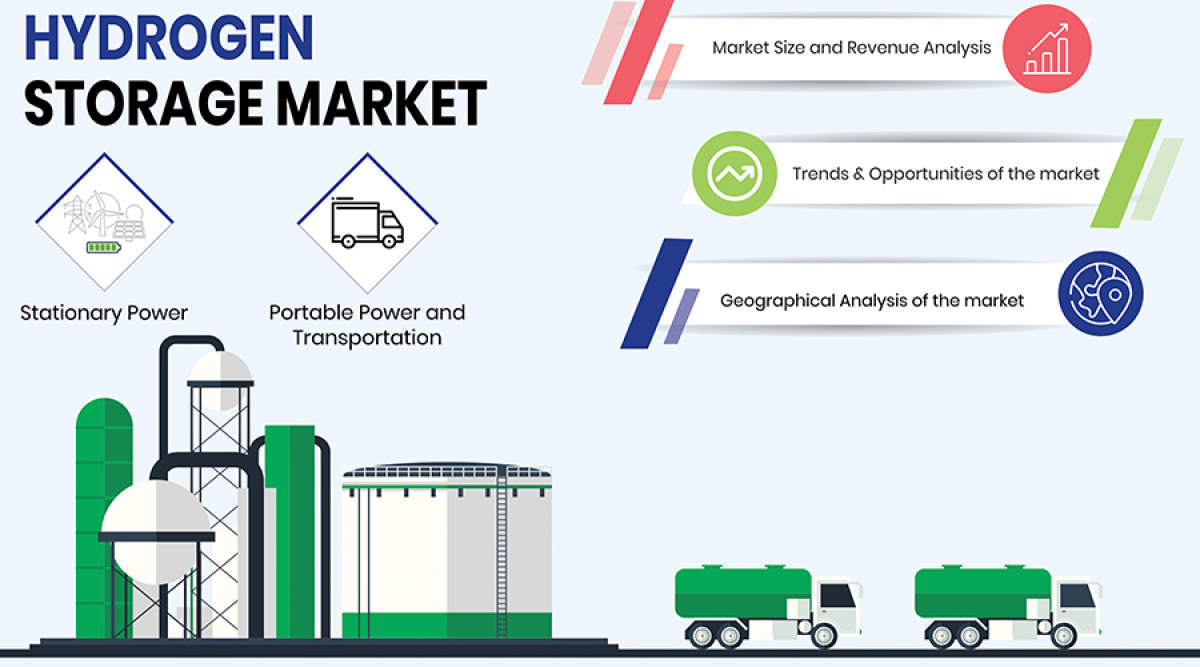Hydrogen Storage Market size was valued at USD 16.2 Billion in 2023 and , reaching nearly USD 34.45 Billion.in 2033, The total market revenue is expected to grow at a CAGR of 7.97% from 2024 to 2033
Introduction:
The Hydrogen Storage Market plays a pivotal role in the global energy transition towards cleaner and sustainable solutions. As the world increasingly turns its focus towards reducing carbon emissions and embracing renewable energy sources, hydrogen storage technologies are gaining prominence due to their versatility, scalability, and potential to address energy challenges across various sectors. This comprehensive overview explores the diverse landscape of the hydrogen storage market, highlighting key technologies, applications, market drivers, challenges, and future prospects.
Overview of Hydrogen Storage Technologies:
-
- Compressed Hydrogen Storage: Compressing hydrogen gas at high pressures and storing it in tanks is one of the most established methods of hydrogen storage. This technology is suitable for stationary and mobile applications, offering relatively high energy density but requiring robust and heavy storage tanks.
- Liquid Hydrogen Storage: Cooling hydrogen gas to cryogenic temperatures (-253°C) converts it into a liquid state, significantly reducing its volume and enabling more efficient storage. Liquid hydrogen is commonly used in aerospace applications and emerging as a viable option for fueling stations and transportation.
- Metal Hydride Storage: Metal hydrides, such as magnesium hydride and complex metal hydrides, absorb and release hydrogen through reversible chemical reactions, offering compact storage solutions with high hydrogen densities. Metal hydride storage systems are particularly suitable for portable and stationary applications.
- Chemical Hydrogen Storage: Chemical hydrogen storage involves chemically bonding hydrogen with other materials, such as ammonia, methanol, or organic hydrides, to release hydrogen on demand. This approach enables safe and compact storage but requires efficient regeneration processes and may involve complex handling and infrastructure.
- Underground Storage: Utilizing existing underground geological formations, such as salt caverns, depleted oil and gas reservoirs, and aquifers, for hydrogen storage offers large-scale, long-duration storage capabilities. Underground storage provides operational flexibility and can leverage existing infrastructure for hydrogen distribution.
Applications of Hydrogen Storage:
-
- Transportation: Hydrogen storage plays a crucial role in fuel cell vehicles (FCVs), where hydrogen gas or liquid is stored onboard and fed to fuel cells for electricity generation. Additionally, hydrogen-powered buses, trucks, trains, and maritime vessels utilize various storage technologies to enable zero-emission transportation.
- Stationary Power Generation: Hydrogen storage enables the deployment of fuel cells for stationary power generation applications, such as backup power systems, remote off-grid installations, and distributed energy generation. Stored hydrogen can be used to produce electricity on demand, providing reliable and clean power.
- Industrial Processes: Hydrogen storage supports various industrial applications, including hydrogenation reactions in chemical manufacturing, metal processing, and refinery operations. Stored hydrogen serves as a versatile feedstock for producing chemicals, refining petroleum products, and reducing emissions in industrial processes.
- Energy Storage: Hydrogen storage facilitates the integration of renewable energy sources into the electricity grid by storing excess energy during periods of low demand or high generation. Hydrogen can be converted back to electricity using fuel cells or gas turbines when needed, enhancing grid stability and resilience.
Market Drivers:
-
- Decarbonization Initiatives: Growing concerns over climate change and air pollution are driving governments, businesses, and consumers to adopt cleaner energy solutions. Hydrogen storage technologies play a vital role in decarbonizing transportation, industry, and power generation sectors, aligning with global decarbonization goals.
- Renewable Energy Integration: The increasing penetration of renewable energy sources, such as wind and solar power, creates the need for effective energy storage solutions. Hydrogen storage offers long-duration storage capabilities, complementing intermittent renewable energy generation and supporting grid stability and reliability.
- Technological Advancements: Ongoing research and development efforts are driving advancements in hydrogen storage technologies, improving efficiency, safety, and cost-effectiveness. Innovations in materials science, nanotechnology, and system integration are enhancing the performance and scalability of hydrogen storage solutions.
- Government Support and Investments: Governments worldwide are implementing supportive policies, incentives, and funding programs to promote hydrogen storage technologies. Initiatives such as hydrogen strategies, funding grants, tax incentives, and public-private partnerships are fostering investment in hydrogen infrastructure and market growth.
- Industry Collaboration and Partnerships: Collaboration between industry players, research institutions, and academia is accelerating the commercialization of hydrogen storage technologies. Joint ventures, technology partnerships, and knowledge-sharing initiatives facilitate innovation, scale-up, and deployment of hydrogen storage solutions.
Receive the FREE Sample Report of Hydrogen Storage Market Research Insights @ https://stringentdatalytics.com/sample-request/hydrogen-storage-market/13355/
Market Segmentations:
Global Hydrogen Storage Market: By Company
• Air Liquide
• Linde plc
• Praxair Technology
• Worthington Industries
• McPhy Energy S.A.
• Luxfer Holdings PLC
• Hexagon Composites ASA
• H Bank Technologies Inc.
• Inoxwind
• VRV S.r.L.
• Cella Energy
• American Elements
• Sigma-Aldrich Co.
• Hanwha Solutions/Chemical Corporation
• Eutectix
• Pragma Industries
• Ilika and Fosroc
Global Hydrogen Storage Market: By Type
• Cylinder
• Merchant/bulk
• Onsite
• On-board
Global Hydrogen Storage Market: By Application
• Chemical
• Oil Refining
• General Industry
• Transportation
• Metal Working
Regional Analysis of Global Hydrogen Storage Market
All the regional segmentation has been studied based on recent and future trends, and the market is forecasted throughout the prediction period. The countries covered in the regional analysis of the Global Hydrogen Storage market report are U.S., Canada, and Mexico in North America, Germany, France, U.K., Russia, Italy, Spain, Turkey, Netherlands, Switzerland, Belgium, and Rest of Europe in Europe, Singapore, Malaysia, Australia, Thailand, Indonesia, Philippines, China, Japan, India, South Korea, Rest of Asia-Pacific (APAC) in the Asia-Pacific (APAC), Saudi Arabia, U.A.E, South Africa, Egypt, Israel, Rest of Middle East and Africa (MEA) as a part of Middle East and Africa (MEA), and Argentina, Brazil, and Rest of South America as part of South America.
Click to Purchase Hydrogen Storage Market Research Report @ https://stringentdatalytics.com/purchase/hydrogen-storage-market/13355/?license=single
Market Challenges:
-
- Cost Competitiveness: The upfront costs associated with hydrogen storage technologies, including infrastructure, equipment, and materials, remain a significant barrier to widespread adoption. Achieving cost competitiveness with conventional energy storage options is crucial for market penetration and scalability.
- Infrastructure Development: The lack of hydrogen infrastructure, including production, storage, distribution, and refueling facilities, poses challenges to the widespread deployment of hydrogen storage technologies. Developing a comprehensive hydrogen infrastructure network requires substantial investment and coordination among stakeholders.
- Safety and Regulatory Concerns: Ensuring the safe handling, storage, and transportation of hydrogen is essential to address regulatory and public safety concerns. Establishing standards, regulations, and guidelines for hydrogen storage systems and infrastructure is critical to building confidence and trust in the technology.
- Technological Barriers: Despite significant progress, technological barriers such as limited energy density, efficiency losses, and material degradation continue to hinder the widespread adoption of hydrogen storage technologies. Research and development efforts are needed to overcome these challenges and improve the performance and reliability of hydrogen storage systems.
Future Outlook and Opportunities:
-
- Market Growth Potential: The hydrogen storage market is poised for substantial growth driven by increasing demand for clean energy solutions, technological advancements, and supportive government policies. Emerging applications in transportation, energy storage, and industrial sectors present new opportunities for market expansion.
- Innovation and Research: Continued investments in research and development are essential to unlock the full potential of hydrogen storage technologies. Innovations in materials science, system design, and manufacturing processes will drive improvements in performance, cost-effectiveness, and scalability of hydrogen storage solutions.
- Global Collaboration: International collaboration and partnerships are crucial for accelerating the deployment of hydrogen storage technologies on a global scale. Collaborative initiatives, knowledge-sharing platforms, and technology transfer programs will facilitate the exchange of expertise and resources to address common challenges.
- Market Diversification: The hydrogen storage market is diversifying with the emergence of new technologies, applications, and market players. Opportunities exist for stakeholders across the value chain, including technology developers, equipment manufacturers, project developers, investors, and end-users, to capitalize on the growing market demand.
Conclusion:
The Hydrogen Storage Market represents a critical component of the transition towards a low-carbon and sustainable energy future. With advancements in technology, supportive policies, and increasing market demand, hydrogen storage solutions are poised to play a central role in enabling clean energy deployment across diverse sectors. Addressing challenges and seizing opportunities will be key to realizing the full potential of hydrogen storage technologies and unlocking their benefits for society and the environment.
About Stringent Datalytics
Stringent Datalytics offers both custom and syndicated market research reports. Custom market research reports are tailored to a specific client’s needs and requirements. These reports provide unique insights into a particular industry or market segment and can help businesses make informed decisions about their strategies and operations.
Syndicated market research reports, on the other hand, are pre-existing reports that are available for purchase by multiple clients. These reports are often produced on a regular basis, such as annually or quarterly, and cover a broad range of industries and market segments. Syndicated reports provide clients with insights into industry trends, market sizes, and competitive landscapes. By offering both custom and syndicated reports, Stringent Datalytics can provide clients with a range of market research solutions that can be customized to their specific needs.
Reach US
Stringent Datalytics
+1 346 666 6655
Social Channels:




Leave a Reply